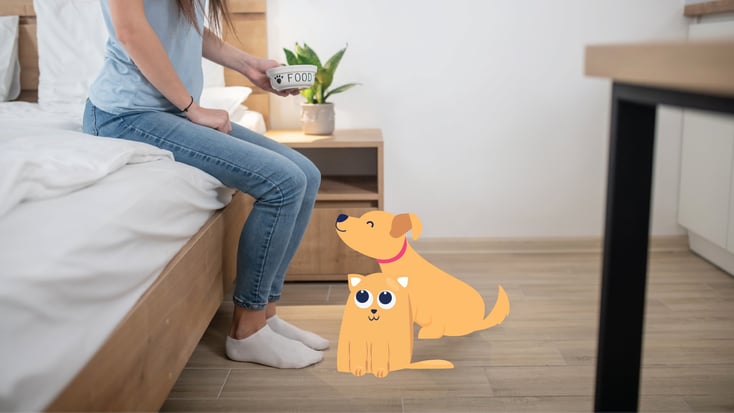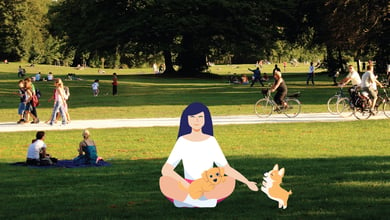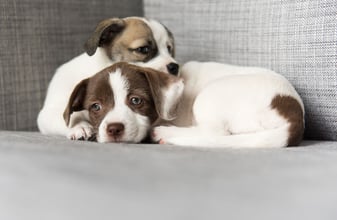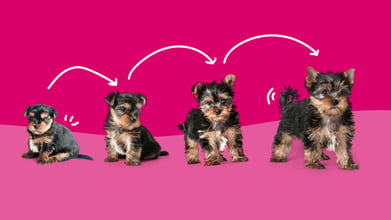Housetrain Your Puppy: 9 Pro Tips for Fast Success

Table of Contents
Congratulations on your new furry family member! This is such an exciting time, and housetraining your puppy is one of your biggest responsibilities as a new puppy parent. Although every puppy housetraining scenario will differ slightly, it helps to understand some of the basics.
In this post, we’ll cover the steps required to house-train your puppy and answer the most common questions new puppy owners have about the process.
1. Establish a Routine
Consistency is key when housetraining your puppy. Set a regular feeding schedule and take your puppy outside for bathroom breaks at consistent intervals. Puppies typically need to go after waking up, playing, and eating.
2. Choose a Potty Spot
Designate a specific area in your yard or nearby green space for your puppy to eliminate. Consistently take them to this spot, as this helps reinforce the desired behavior.
Note from a vet: Bear in mind that your puppy’s natural behavior is to eliminate whenever and wherever they please. This will continue until they start to understand what their human counterparts want. Most puppies will not be able to hold their eliminations for longer than a few hours until 3-4 months of age when this time will gradually begin to increase.
3. Use a Cue Word
As your puppy starts to eliminate, introduce a cue word like "potty" or "go." This helps them associate the word with the action, making future housetraining sessions more efficient.
4. Praise and Reward
Immediately praise your puppy and offer a small treat after they've successfully gone to the bathroom in the designated area. Positive reinforcement training is crucial in helping your puppy learn what's expected of them.
5. Supervise and Prevent Accidents
Keep a close eye on your puppy while indoors, and look for signs they need to go, such as sniffing, circling, or whining. If you catch your puppy in the act, clap your hands to interrupt them and immediately take them outside to their potty spot.
6. Cleaning Up Accidents
Accidents will happen. When they do, clean the area thoroughly with an enzymatic cleaner to remove any lingering odor that may encourage your puppy to eliminate there again.
7. Crate Training
Utilize a crate to help your puppy learn to hold their bladder and bowel movements while unsupervised. Ensure the crate is appropriately sized, allowing just enough room for your puppy to stand up, turn around, and lie down comfortably.
8. Gradually Increase Freedom
As your puppy becomes more reliable with housetraining, slowly grant them more freedom to roam the house. Always supervise them to prevent any setbacks.
9. Be Patient and Consistent
Housetraining a puppy takes time and patience. Maintain a consistent routine and use positive reinforcement to encourage good behavior.
Remember, every puppy is different, and housetraining may take longer for some than others. If you have concerns or need additional guidance, the BetterVet team is here to help with expert advice and support for all your puppy's needs.
Virtual Vet Visits for Your Peace of Mind
Connect with an online vet from the comfort of your home. Convenient, affordable, and stress-free!
Factors That Affect How Long Housetraining Takes
A variety of factors can impact how long the new puppy housetraining process takes, such as:
- Breed: Some breeds are quick learners, while others may require more time and patience.
- Age: Younger puppies have less bladder control, making housetraining more challenging.
- Consistency: Maintaining a consistent housetraining routine and approach is crucial for faster learning.
- Prior Experiences: Puppies from clean environments adapt more easily, while those from less hygienic settings may take longer.
- Positive Reinforcement: Rewards and praise expedite the learning process, while punishment can hinder it.
Individual Temperament: Each puppy's personality and intelligence impact their housetraining progress. - Health Issues: Medical conditions affecting elimination control can affect housetraining progress.
- Owner Dedication: Your commitment and patience greatly contribute to your puppy's success.
By considering these factors and maintaining a consistent, positive approach to housetraining, you can help your puppy achieve success more quickly. Remember that patience and persistence are key, every puppy learns at their own pace.
Get Puppy Housetraining Help With BetterVet
Successfully housetraining your puppy requires patience and knowledge. Using these tips as a guide, you'll soon be well on your way to a potty-trained pup! If you're facing challenges in puppy potty training, we're here to help.
Book an appointment with a BetterVet doctor for guidance. BetterVet's veterinarians are here to answer any questions or concerns you may have about the house training process, either through a home visit or telemedicine video consultation.
Frequently Asked Questions
At what age should a puppy be housetrained?
Generally, it is recommended to start house training when your puppy is between 8 to 12 weeks old. Most puppies at this age can begin to understand commands, especially with food rewards, and the earlier you start, the easier it will be to ingrain the training in your puppy’s mind.
How Long Does It Take to Potty Train a Puppy?
For most puppies, it takes between 4 and 6 months to become fully housetrained. However, each puppy's situation is different. Therefore, each timeline may differ. As you consider puppy home preparation to bring your new friend home, it's an excellent time to consider what you may need to support the potty training process.
How hard is it to housetrain a puppy?
Housetraining is not an easy task, especially for first-time puppy owners. Their natural instinct is to eliminate freely, so this is a learning process that will have setbacks along the way. If you're experiencing ongoing trouble house training your puppy, talk to your BetterVet veterinarian about supportive in-home puppy behavioral counseling. Trying a new puppy training method may also bolster your success.






